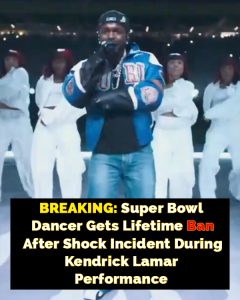During this year’s Super Bowl, an unexpected and controversial moment stirred debate across the nation and social media when a dancer involved in Kendrick Lamar’s halftime performance was banned for life from all NFL events. The reason? He unfurled a Sudanese-Palestinian flag during the high-profile show, which took place at Caesars Superdome in New Orleans.

As with every Super Bowl, the game wasn’t just about football. While fans eagerly tuned in to watch the Philadelphia Eagles take on the Kansas City Chiefs, many were just as interested in the spectacle that accompanies the event. The Eagles claimed a decisive 40-22 victory over the Chiefs, a major shift from their previous heartbreaking 35-38 loss in February 2023. But even with the Eagles crushing the Chiefs’ hopes of a three-peat, the most talked-about aspect of the night came not from the field—but from the halftime show.
Kendrick Lamar’s performance was highly anticipated and filled with energy, featuring 11 songs within a 13-minute set. He was joined on stage by SZA for a powerful live collaboration and supported by appearances from big names like Serena Williams, Samuel L. Jackson, and DJ Mustard. The performance also reignited tensions with rapper Drake, Lamar’s rival, with subtle digs and bold artistic choices. Lamar’s set captivated audiences with provocative imagery and strong messaging, creating no shortage of social media buzz.
Yet, the most unexpected twist came when a man, later identified as Zul-Qarnain Nantambu, posed as one of the 400-member field cast dancers and took center stage for reasons beyond choreography. While standing on top of a prop car, he suddenly unfurled a flag that bore the names “Gaza” and “Sudan”—two regions currently experiencing deep and tragic conflict. The banner, combining the colors and symbols of both the Sudanese and Palestinian causes, was waved in front of thousands in the stadium and millions more watching live across the world.
After briefly capturing attention, the man jumped off the car and sprinted across the field, prompting a swift reaction from security. He was quickly tackled and removed from the premises. Though it happened in seconds, the act generated massive online discussion, with some praising his bravery while others criticized the disruption of a professional sporting event.
Three days after the Super Bowl, the NFL officially addressed the incident. In a statement released to UPI and shared by Yahoo, the league stated: “We commend security for quickly detaining the individual who displayed the flag. He was part of the 400-member field cast. The individual hid the item on his person and unveiled it late in the show. No one involved with the production was aware of the individual’s intent. The individual will be banned for life from all NFL stadiums and events.”
The NFL’s response made it clear that they had no knowledge of or involvement in the political stunt. Their decision to issue a lifetime ban was framed as a matter of safety, policy, and professionalism. The ban means Zul-Qarnain Nantambu will not be allowed to attend any future NFL games or events in any stadium nationwide.
Following the announcement, Nantambu spoke to NBC about his motivations. In his own words, he aimed to use the massive stage of the Super Bowl to bring attention to the suffering people in Sudan and Palestine are enduring. “And I know it would invigorate their faith, seeing somebody supporting them and thinking about them on such a grand stage to bring awareness to that, to their struggles,” he said. “Maybe we don’t have the military prowess to stop the war, but we can at least do what we can to help those who are afflicted by these different atrocities in these countries.”
His comments have added more complexity to the story. While his stunt broke the rules of the event, it’s evident his goal was to raise awareness rather than cause harm. Many human rights advocates have pointed out that using platforms like the Super Bowl, which commands an audience of over 100 million viewers, can be a powerful way to highlight global crises that often go unnoticed in mainstream media.
However, critics argue that there is a time and place for political activism—and a sports event watched by families around the world may not be the right forum. They claim that injecting political messages into entertainment can alienate viewers and detract from the purpose of the event, which is meant to unite people in celebration of athletic excellence and national spirit.
Still, the issue continues to be debated fiercely online. Some see Nantambu as a courageous figure willing to sacrifice his own public standing to shine a light on oppressed populations. Others see him as an attention-seeker who hijacked a major performance for personal and political gain. Regardless of the side one takes, the incident underscores the evolving nature of protest in the age of global connectivity and viral moments.
The Super Bowl has long been more than just a football game—it’s a cultural event that reflects the values, divisions, and passions of America. Whether through commercials, musical performances, or unexpected acts like this one, it often becomes a lens through which society examines itself.
Kendrick Lamar, who is no stranger to incorporating social issues into his art, did not directly address the incident. However, many are speculating about how he and other artists involved in the show might respond, either through future performances or public statements.
In the end, this year’s Super Bowl will be remembered not only for the Eagles’ impressive comeback but also for the moment when one man took a personal stand in front of the world, sparking conversation about war, awareness, and the boundaries of protest. The legacy of that act—whether viewed as heroic or inappropriate—will likely linger long after the cheers have faded and the season has ended.





